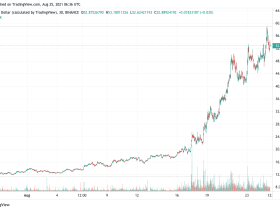The most common question regarding how cryptocurrency gains value is: how do you get more coins? The answer to this question depends on several factors, including Supply and Demand. Moreover, the amount of media coverage and Peer-to-peer transactions play a significant role in the cryptocurrency price’s upward movement. Read on to discover how the digital currency works! And don’t forget to share this article with your friends and family. This way, they can also gain from its success.
Demand
There is a great deal of market activity surrounding cryptocurrency, but demand is not the only factor that drives prices. The finite supply of digital currencies like Bitcoin, which has a total supply limit of 21 million BTC, is a significant factor that will drive investors to invest in the crypto market. This is the same reason people invest in gold and crude oil. With limited supply, prices will increase, thereby driving up the price of each BTC.
But there is also considerable risk involved with cryptocurrencies. In the absence of any central authority, they serve as a vehicle for illicit activity. The cryptocurrency market has been used as a platform for fraudulent activities such as pump and dump schemes and Ponzi schemes. Fortunately, regulators are taking action. Recently, the SEC suspended trading in three publicly traded blockchain-related companies. The Commodity Futures Trading Commission cracked down on an alleged Ponzi scheme called Gelfman Blueprint, Inc.
Supply
To understand the relationship between supply and value of a cryptocurrency, it’s essential to know how coins are made. Basically, supply is the number of coins in circulation. However, there is an important exception to this rule. For example, bitcoin has a limited supply of 21 million coins. Every four years, the reward for mining bitcoin will be cut by half, which results in fewer coins entering circulation. Purchasing a cryptocurrency with a limited supply is an excellent way to profit from future increases in value. It is also important to understand that finite supply usually causes price spikes, so buying a coin with limited supply is a smart move if you intend to hold on to your cryptocurrency for a long time.
Likewise, the value of a cryptocurrency can increase or decrease depending on the supply. Bitcoin’s value has a large range, and smaller coins are subject to wider swings. To get a better understanding of how a cryptocurrency’s value is determined, we can use a formula. We can calculate market cap from two different sources. One is market cap, which represents the amount of capital invested in a particular cryptocurrency.
Media coverage
The rise in the price of Bitcoin in April was largely due to regulatory guidance issued by the US Financial Crimes Enforcement Network (FinCEN) and the Cypriot financial crisis, and media coverage surged. According to Bitcoin core developer Mike Hearn, most price fluctuations are self-feeding. As soon as a sudden increase in price hits the media, more people are attracted to the cryptocurrency market and begin to speculate.
The increase in Bitcoin’s price often coincides with news coverage of major events, such as the Silk Road cyberattack. In fact, there were 14,179 mentions of Bitcoin in the US in November. The rise in its price could have been a result of a heightened media profile, as it was also a reaction to the cyberattack that took place on the Silk Road. However, there’s no definitive evidence that media coverage has a causal connection between Bitcoin price growth and the news coverage of major events.
Peer-to-peer transactions
While cryptocurrency can be used as a store of value, the process can be complicated. The lack of regulatory oversight can result in regulation arbitrage, as well as the need for third-party intermediaries to facilitate transactions. This also has an impact on how cryptocurrencies are legally owned and whether or not users can seek recourse when a transaction goes wrong. However, there are a number of solutions to these problems.
Unlike traditional currencies, cryptocurrencies enable consumers to bypass bank and credit card processing requirements, allowing them to transact without intermediaries. This technology can facilitate financial inclusion in countries such as Africa, where many consumers are excluded from traditional banking systems. However, it also raises significant regulatory issues, and is likely to cause concern amongst governments and the general public. Moreover, cryptocurrency may facilitate the use of illegal activities, such as money laundering and terrorism financing.
Blockchain technology
The adoption of blockchain technology has created new market structures that facilitate disintermediation. Dominant players have a competitive advantage because they can develop and implement market solutions with lower coordination requirements and fewer regulatory approvals. But they face a risk of being locked out of the exclusive club if they move too quickly. Nevertheless, companies that join a select consortium early will mitigate this risk. This approach will require strong leadership and deep technical expertise.
The use cases of blockchain technology are numerous and diverse. Some of them include keeping voter information and ensuring proper functioning of the electoral process. Another use case involves maintaining real estate ownership and title records. Blockchain is also a good solution for improving the supply chain of many businesses. The absence of human error in a chain of supply chains is a major concern for these companies. This new technology will eliminate human error and ensure that all parties involved in a transaction are aware of its status.
























